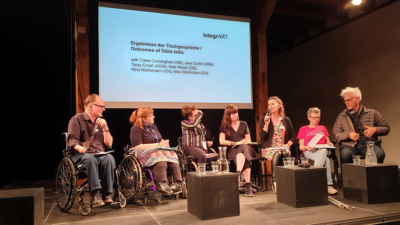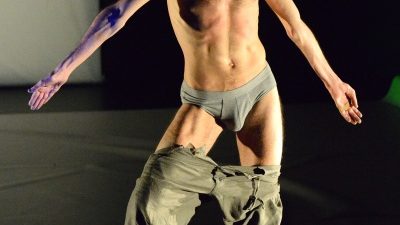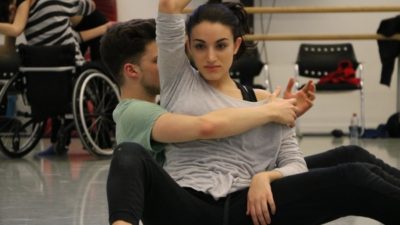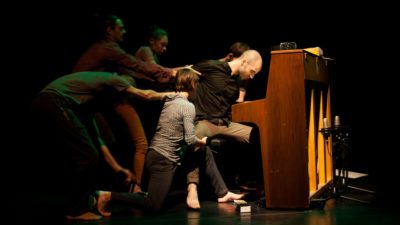In the latest country profile, disabled journalist and artist Kate Lovell examines the exploding disability arts scene in Switzerland.
When seeking to discover the disabled talent making innovative work in Switzerland, on its stages is the best place to find home-grown disabled artists. The performing arts are the stand-out creative form trailblazing disability-focused work in the Swiss arts scene, with dance leading the way in terms of inclusive practice. A body-based and visually expressive artistic form is a natural way to bring together people from a multi-lingual country to focus on a shared desire to facilitate an environment that allows artists from all backgrounds to creatively collaborate. Switzerland is, after all, separated into regions which predominantly speak either French, German or Italian, though many are multi-lingual.
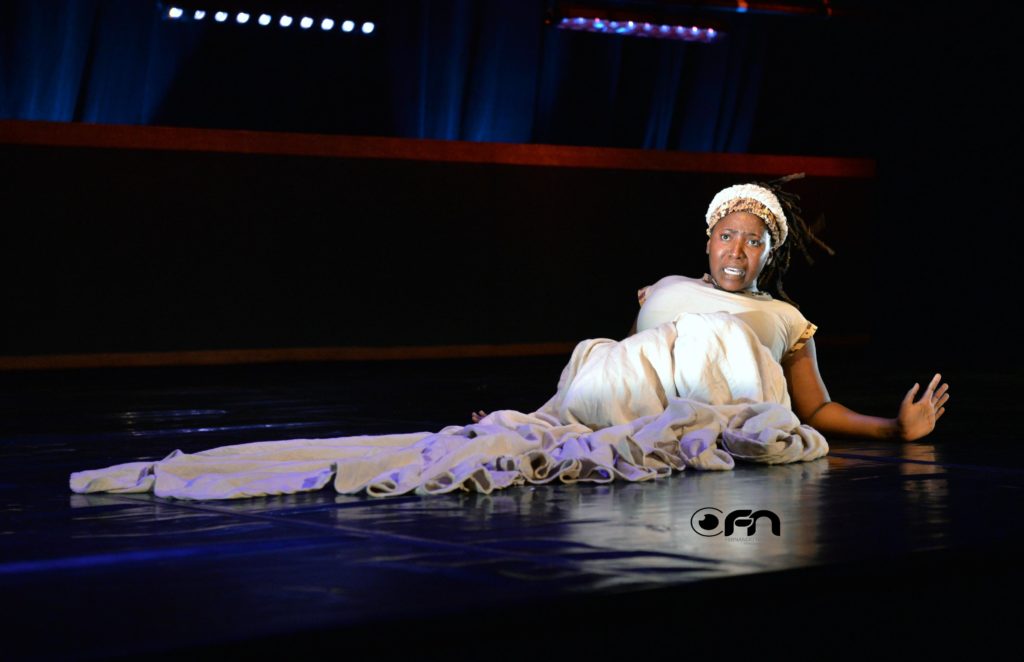
A network of inclusive festivals
Switzerland is fairly unique in that it has a joined-up network of festivals promoting the work of disabled artists, falling under the umbrella of IntegrArt. IntegrArt includes four partner festivals in different regions of the country plus a symposium in Zurich, each of which takes place every two years:
- WILDWUCHS Festival is based in Basel, which is largely German speaking;
- Out of the BOX Festival, in French-speaking Geneva;
- BewegGrund.Das Festival organised in mostly German-speaking Berne;
- ORME Festival takes place in the Italian-speaking city of Lugano.
IntegrArt acts as a catalyst for disabled artists in Switzerland, elevating their work and drawing interest from arts practitioners across Europe. Many of the same performances travel to each festival. This year, IntegrART and its partner festivals also presented a short piece, ‘Unforeseen Ailities’ which is the result of a new, inclusive training module taught for the first time as part of the bachelor’s course in Contemporary Dance at the Zurich University of the Arts.
Isabella Spirig is a founder of the IntegrART initiative, as well as being the dance project leader for Migros Culture Percentage, a significant Swiss voluntary organisation which aims to improve access to culture for the public. Spirig describes her reasons for launching IntegrART: “To integrate different abilities and physicality in the professional performance scene challenges the creativity of the artists anew and expands the artistic horizon. To share the experience of ‘diversity in art as utopia for everyday life’ with people, and above all to make it accessible to an audience, was and is the motivation for IntegrArt.”
It’s striking to note that Spirig’s passion stems from her belief that inclusive work renews creativity and therefore creates more exciting work. There is nothing ‘worthy’ about her impetus: simply, the collaborations create better, more interesting art.
Select Companies and Artists
In the arena of drama, Theatre HORA are the major players pioneering theatre with disabled artists. Established in 1993, they are the only professional Swiss theatre company whose ensemble is made up of learning-disabled performers and creatives. The company have worked with high-profile directors and choreographers, such as Milo Rau and Jérôme Bel, and one of their performers, Julia Häusermann was the recipient of the prestigious Alfred-Kerr-Darstellerpreis award for best actor, competing against non-disabled counterparts. A particularly revolutionary project is the Freie Republik HORA, where learning disabled actors can direct their own work. Whilst allies of disabled artists have been working hard to create opportunities for their work to the showcased, disabled-led work is rare: Freie Republik HORA challenges the status quo.
Teatro Danzabile operate within the Italian-speaking region of Switzerland and are a professional dance-theatre company, formed in 2005, whose interest lies in scenic research around the work of disabled and non-disabled performers making dance-theatre collaboratively. They host the ORME Festival in partnership with Inclusione Andicap Ticino Association, who work to improve access to work and culture for disabled people.
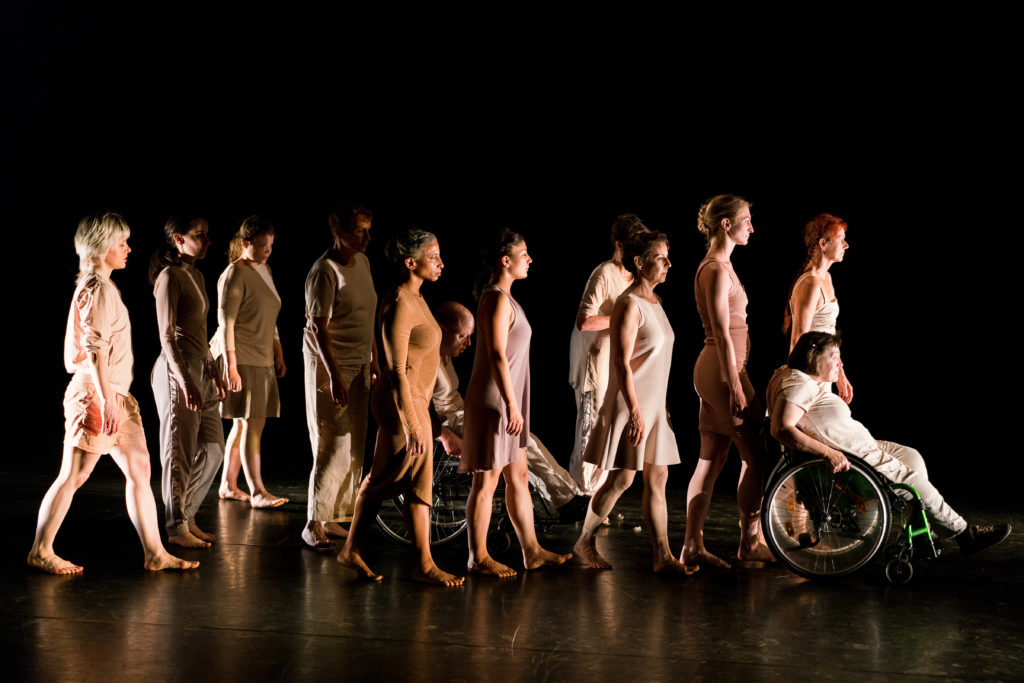
BewegGrund is an inclusive dance company founded in 1998, run by artistic director Susanne Schneider. Supported by funding body Pro Helvetia, BewegGrund launched the SPARKproject, bringing together the expertise of leading companies in professional inclusive dance, prestigious dance festivals and a dance production centre, with partners from Sweden, Italy, the UK, Germany, Croatia, Switzerland and Norway. SPARK seeks to strengthen ties between these professional companies and to share learning and practice around specific working methods and choreographic approaches in inclusive dance. The hope is that disabled dancers working for each company can learn different choreographic techniques, and begin touring with different partners, leaving their ‘home’ companies to work pan-Europe. The partnership will also allow greater opportunities for touring inclusive dance across the region.
Alessandro Schiattarella is a dancer, choreographer and videographer based in Basel whose work focusses on ‘less-visible disability’. He works nationally across Switzerland and has toured internationally with self-choreographed works Altrove and Tell Me Where It Is, both of which explore Schiattarella’s experience as a disabled dancer. Schiattarella has danced in a number of mainstream companies including Bejart Ballet Lausanne, the Ballet Du Grand Theatre de Geneve, the Scapino Ballet Rotterdam, the Konzerttheater Bern and Ballett Basel.
Mops_DanceSyndrome is a contemporary dance company based in Locarno (Italian speaking region). It was established in 2008 by choreographer Ela Franscella. It is composed exclusively of dancers with Down Syndrome and offers its members ongoing education in contemporary dance. The company has produced more than 10 productions, which have toured nationally and internationally and has also produced films which have been screened at festivals worldwide.
Funding
Pro Helvetia are the Swiss Confederation’s cultural promotion institution and support arts projects that are of national interest. Their focus is on high-quality work and diversity, making disability arts a significant area of interest for the organisation. Pro Helvetia is defined as a public-law foundation: they have tasks that are enshrined in Swiss law, specifically in the Culture Promotion Act of 2009, but act autonomously to carry out the assigned commissions.
Migros Culture Percentage is a key funder of the arts in Switzerland and has an innovative funding model. Migros is Switzerland’s largest retailer and supermarket chain who operate a co-operative structure. The retail giant has made a commitment to donate 1% of their annual turnover to the arts, with the Migros Culture Percentage managing this side of their business model.
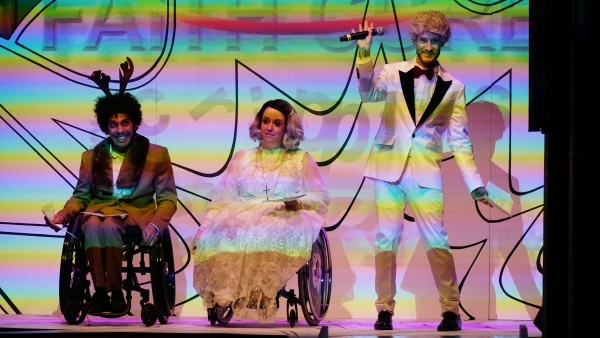
The Swiss Department for Culture, in partnership with disability charity Pro Infirmis administer the ‘Kultur Inklusiv’ initiative which recognises cultural organisations which demonstrate a ‘sustained commitment to the accessibility of their cultural offerings and to the cultural participation of all interested people – including those with disabilities’. IntegrArt was awarded the label in 2018, joining many of its partner festivals and organisations as well as BewegGrund and Teatro Danzabile.
Looking to the future
Kathrin Veser is the dramaturg at Gessnerallee Zürich, which is one of the most important production and demonstration sites for performative arts in Switzerland. Gessnerallee Zürich host the IntegrART symposium and performances. Veser explains that the disability arts scene in Zurich has grown significantly in recent years:
“When we started at Gessnerallee in 2012, Theater Hora was the only player in Disability Arts in Zurich. Now, just in May this year there were a total of four projects (Michael Turinski / Teresa Vitucci / Claire Viviane Sobotke, Theater Hora / hauen & stechen, Jörg Köppl/Ensemble Metanoia and Jeremy Wade/Nina Mühlemann) being presented in three performing arts institutions. There’s much more interest in questions referring to disability on stage than there was a couple of years ago, and it’s also much easier to get funding for those projects.”
Although Veser stresses that she can only speak for Zurich itself, these advances in interest and funding spell good news for the potential for growth of the disability arts scene in general. Of course, there are the usual barriers, not least physical access – Gessnerallee’s offices and some studios are themselves inaccessible. Veser believes access laws in Switzerland are weak and slow to change.
Switzerland appears to be reaching a watershed point, where inclusive work within the performing arts is climbing up the artistic agenda. If interest in and funding for work that champions disabled artists continues to grow, this could usefully increase pressure on the governmental policies around access to improve in line with the appetite for artistic development.


